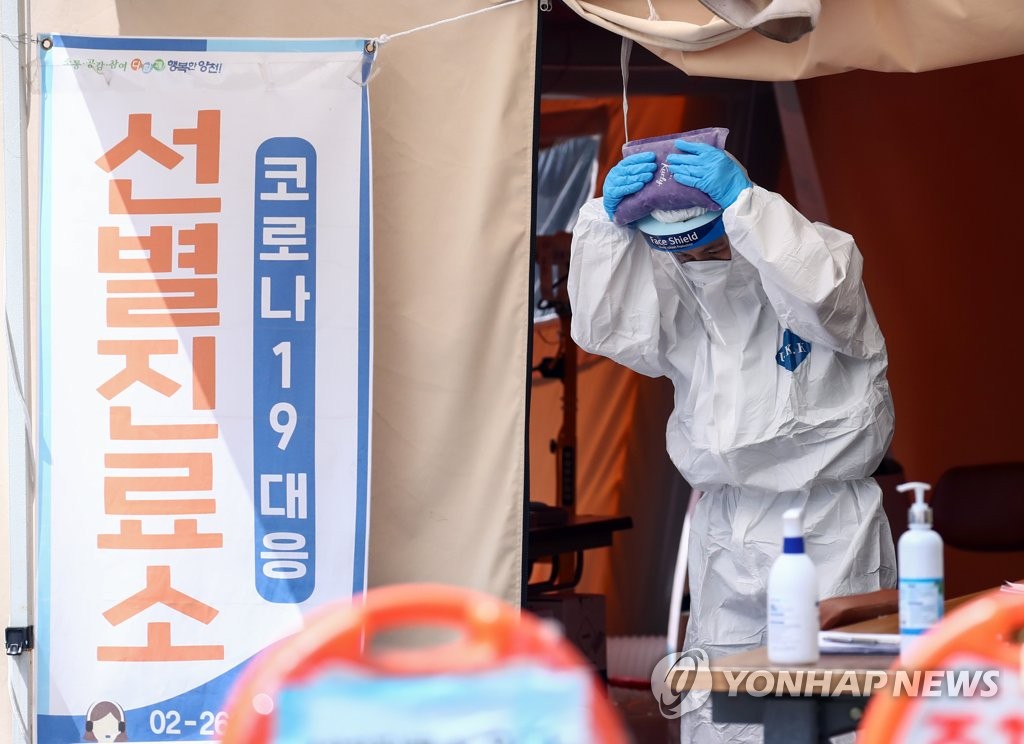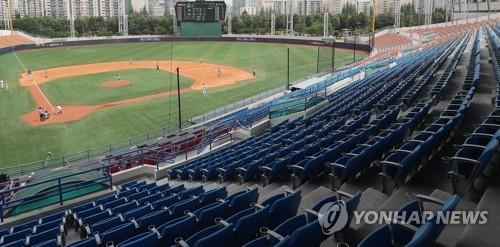- California Assembly OKs highest minimum wage in nation
- S. Korea unveils first graphic cigarette warnings
- US joins with South Korea, Japan in bid to deter North Korea
- LPGA golfer Chun In-gee finally back in action
- S. Korea won’t be top seed in final World Cup qualification round
- US men’s soccer misses 2nd straight Olympics
- US back on track in qualifying with 4-0 win over Guatemala
- High-intensity workout injuries spawn cottage industry
- CDC expands range of Zika mosquitoes into parts of Northeast
- Who knew? ‘The Walking Dead’ is helping families connect
New virus cases slow slightly, cluster infections still grip greater Seoul
South Korea’s new virus cases slowed slightly Thursday, but the greater Seoul area is still haunted by a steady rise in cluster infections despite toughened measures to stem further community spread in the metropolitan area.
The country added 45 new cases, including 40 local infections, raising the total caseload to 11,947, according to the Korea Centers for Disease Control and Prevention (KCDC).
It marked a slight decrease from a day earlier when the figure reached 50.
All of the locally transmitted cases were reported from the Seoul metropolitan area.
South Korea lifted a nationwide social distancing scheme on May 6, but it enhanced measures in Seoul and the surrounding regions, as a number of infection clusters sprang up.


A medical worker cools his head with an ice pack at a makeshift clinic in western Seoul on June 11, 2020. (Yonhap)
Cases traced to a warehouse run by e-commerce leader Coupang in Bucheon, just west of Seoul, reached 146, up two from the previous day. Those linked to small churches in the metropolitan area also increased by two to reach 94.
COVID-19 cases linked to a table tennis gym in southwestern Seoul came in at 60 on Thursday, according to the KCDC.
Cases tied to a door-to-door business establishment rose to 116 as of Thursday, with patients aged 60 and above accounting for nearly 70 percent. The first virus patient from the company was reported on June 2.
Seven cases were reported from the Defense Security Support Command, located in Gwacheon, just south of Seoul.
A parcel delivery man who works at a distribution center of CJ Logistics Corp. in western Seoul also tested positive Thursday, although this was not included in the official daily tally. Health authorities are carrying out tests on some 250 workers at the center.
The string of cluster infections in the densely populated area came as South Korea completed its phased reopening of schools Monday. Some 500 schools from the metropolitan area, however, delayed their reopening due to cluster infections.
This week will be a critical juncture in deciding whether to maintain the tightened distancing measures in the capital area.
South Korea said related discussions are still under way.
Health authorities remain concerned over the rising possibility that the second wave of the pandemic may strike the country earlier than expected.
The metropolitan area accounted for a whopping 97 percent of the new locally transmitted cases reported this month.
“As the virus is spreading quickly, there is a limit in containing the spread just by tracking people who have made contact with COVID-19 patients,” Yoon Tae-ho, a senior health official, said in a daily briefing. “Thus, all people must follow sanitary guidelines to slow the expansion.”
The total death tally remained unchanged at 276, with the fatality rate reaching 2.31 percent.
The total number of people released from quarantine after full recoveries stood at 10,654, up 43 from the previous day.
The country has carried out 1,066,888 COVID-19 tests since Jan. 3. The figure translates to roughly 1 out of every 50 South Koreans receiving COVID-19 tests.
The number of imported cases rose by five to reach 1,312. Nearly 90 percent of such patients were South Korean nationals.











